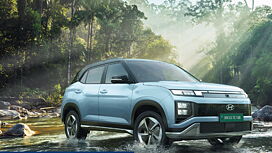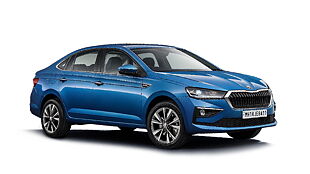Why would I buy it?
- Handsome looks
- Loads of features and safety equipment
- Refined motor, smooth DSG, and ride quality
Why would I avoid it?
- Engine needs more punch
- Smaller in dimension compared to rivals
Verdict

The Kushaq has a Herculean task set forth, long before it even enters the Indian market. Its toughest labour (so difficult as if it’s been determined by Eurystheus himself) is – to defeat the Hyundai Creta in its own game. To do that, the Skoda Kushaq needs to look good – which it handsomely does. It needs to have a decently good engine – which it fairly manages (but without the diesel option). And also have a long list of features – that’s a tick off the box too. But to beat the Creta, it should have a spacious cabin with some feel-good features. Being a Skoda, it’s also expected to have good build quality – another thing it does decently well but leaves some to be desired.

But most importantly, with all its traits, the Kushaq needs to be a value-for-money proposition. Pricing it aggressively is one way the Czech carmaker can make a dent in the segment. But can Skoda manage to do that? Make the Kushaq become the ‘Kushak (king)’ they want it to be?
Engine and Performance
7 / 10

Underpinned by the Indianised version of the highly versatile MQB platform called the MQB-A0 IN, the Kushaq will be offered with two engine options. Apart from the familiar 1.0-litre TSI that does duty in the Rapid, Skoda India will be offering a more powerful 1.5-litre TSI Evo that’s basically a European engine. The 1.0-litre three-cylinder puts out 113bhp/178Nm, while the one we are driving here is a four-cylinder with 148bhp and a healthy 250Nm at disposal. Gearbox option includes a six-speed manual, a six-speed torque converter, and a DSG dual-clutch automatic. We are driving the DSG armed version.

Crank up the motor and you’d find it to be refined and creamy smooth – nothing less was expected of it in the first place. Pull it into D and get going, and the motor unravels itself to be pretty useable in the city. It remains almost linear requiring light throttle inputs to potter around town. With the tachometer hovering under the 2,000rpm mark, it shifts through the gears smoothly, thanks to the advanced DSG. Its peak power is delivered early in the rev-range so there’s barely a need to push the motor towards the redline.

And even when you do give it a good wring, the TSI Evo remains vibe-free as it races towards the 6,000rpm mark. On the flip side, it’s not a motor that’d give you a whiplash each time you smash the throttle. The four-cylinder has a predictable nature but the fun-to-drive factor is subdued to an extent. What’s more, it also comes with something called ‘Active Cylinder Technology (ACT)', which deactivates two cylinders under low load condition, thereby improving fuel efficiency. This cylinder activation and deactivation happens seamlessly without letting the driver know about the wizardry behind the scenes.

Surprisingly, there are no drive modes in the Kushaq. You do get switchable traction control, but different drive modes altering the nature of the engine could have possibly helped solve Kushaq’s dearth of a fun-driving character. That said, it’s not exactly an unenthusiastic engine and isn’t boring to drive. Push it hard and triple-digit speed comes up with no drama and you can cruise at highway speeds all day with no troubles.

Pull the DSG gear lever to S and the motor would happily hold the revs to redline and won’t upshift on its own. And the presence of the paddle-shifter is an added cherry too. The things to write home about the Kushaq include its strong brakes despite the lack of disc brakes on the rear wheels. They have a strong initial bite and add confidence when you are being fervent behind the wheel.
Ride and Handling
8 / 10

Over smooth surfaces, the Kushaq rides like any other European crossover ought to. And trudging through bad patches and rough surfaces our roads cater, the Kushaq continues to impress us with its well-pliant and absorbent ride. Riding on 205/55 section tyres wrapped on 17-inch alloy wheels, even the sharp creases are taken in with suppleness without crashing hard, despite the noticeable hint of firmness. And even at highway speeds, the ride remains pleasant with minimal vertical movements over larger undulations.

With a well-weighted steering wheel of the Skoda Kushaq, the steering response is direct with little to no lag off-centre. Around corners, the turn-ins are nice and easy with body roll well under control. Yet again, offering different drive modes to alter the steering and throttle response combination would have done wonders for making it fit different buyers’ requirements. Nevertheless, the one thing the Kushaq really does better than its rivals is the way it rides and handles.
Interior Space and Comfort
6.5 / 10

Getting inside the Kushaq is fairly easy with good roof height and spot-on seat height. Once inside, the Kushaq’s cabin appears to be divergent. First up, it’s got a monochromatic driver’s display with old-school analogue dials for speedometer and tacho. Its MID screen in the centre is black-and-white too, throwing out only the bare essential details. In contrast, the steering wheel carries an all-new design that can also be found in the Octavia. It has got floating rollers on either side, but the buttons on the steering lack a solid tactile feel.

The design elements with a piano-black strip running across the dash, dotted texture integrated above it, and an integrated chrome strip joining the vertical air vents on the extreme ends of the black-grey finished dashboard- all this does look overdone. We also expected better quality of plastic in few places around the cabin like the door grab handles, lower dashboard, and centre console.

Move to the centre console, and the new 10-inch touchscreen is all-new. It is inspired by the MIB-3 unit from the expensive Skodas. The touch response of the screen is quick and the interface isn’t too difficult to navigate either. You also get mobile telephony through Android Auto and Apple CarPlay along with various other third-party apps for music, navigation, and audiobooks. One interesting element here is that Skoda has decided to offer only USB-C type charging ports and no standard USB-A in the Kushaq.

For the automatic climate control, there are no physical buttons but a feather-touch screen like you used to get in the old Honda City. So, it can be difficult to operate at times, especially when driving. Another snag is a couple of blank buttons present in the strip on the centre console that houses the hazard switch, door-unlock button, and buttons for ventilated seats.

Talking about the seats, they are comfortable and well designed to offer good lower back, side, and shoulder support. There’s a good amount of headroom too for my frame (I am 5’5”) and seat height, and steering adjustment should pose no problem for taller drivers. As for visibility, it’s fairly good thanks to the thin A-pillar and large windows. Getting inside the second row of seat is fairly easy too. With a longer wheelbase than the Creta (2,651mm compared to 2,610mm), the benefit is seen in the more than ample leg space.

Even the scooped-out roof liberates more headroom but the Kushaq would sit only four in comfort. With two seats contoured for better support, the middle seat’s backrest sticks out and the seat base is cut short too. You do, however, get armrest mounted cupholders, two USBs, three headrests, and rear AC vents for the back-seat passengers.

At 385litres, the boot space of the Kushaq is smaller than what’s offered by the rivals. But it offers a deep cargo space with relatively common loading lip height, unobtrusive boot space, and 60:40 split-folding seats as well.
Features and Equipment
7 / 10

This top-spec Ambition trim we have here does come with cooled seats, wireless charger, single-zone climate control, electric sunroof, auto headlamps and wipers, cruise control, smartphone connectivity, rear parking camera, auto-dimming IRVM, cooled glovebox, and ambient lighting. It also gets six airbags, ESC, hill-hold control, multi-collision brake assist, rear parking sensor, TPMS, traction control, ISOFIX child-seat mounts, as well under the safety umbrella.

There are a few of Skoda’s ‘Simply Clever’ features but they are very limited in numbers and we expected some more to make the Kushaq stand out. For taking on the segment bestseller, you need to offer a few first-in-segment equipment and features to make some noise. But the Kushaq appears to have arrived with some firepower short.

Conclusion
7 / 10

First seen as the Vision IN Concept, the Kushaq has a lot riding on its shoulder. It is a part of Skoda’s India 2.0 offensive and the Czech carmaker wants the Kushaq to bring more footfalls to the showroom floor.

What’s likeable about the Kushaq is that it’s a handsome looking crossover; you have to give it that. But a smaller dimension robs it of the imposing stance it could have achieved with the design. There are elements on the inside that have been carried over from the older VW models’ parts bin, which do not bode well for an all-new car that’s built ground up. It’s best used as a four-seater, could have had segment-cracking feel-good features, and its boot space isn’t worth flaunting either.

But the Kushaq is a sensibly built SUV that’s a gateway to a premium European brand. It drives well and would be a comfortable daily runner. Sure it doesn’t have a diesel engine option and the petrol engine could have been slightly punchier but an average buyer won’t mind what the Kushaq is offering.

This brings us to what the Indian buyers want, and how Skoda will be pricing the Kushaq to meet those requirements. All things considered, the Kushaq will need to carry a price tag that is more value for money than its immediate rivals like the Creta, its sibling the Kia Seltos, even the Renault Duster and Nissan Kicks. Only then would it be able to achieve what Skoda has set out to do with the Kushaq.
Pictures by Kapil Angane and Kaustubh Gandhi

![Skoda Kushaq [2021-2023] Right Front Three Quarter Skoda Kushaq [2021-2023] Right Front Three Quarter](https://imgd.aeplcdn.com/642x361/n/cw/ec/96979/skoda-kushaq-right-front-three-quarter37.jpeg?wm=1&q=80)
![Skoda Kushaq [2021-2023] Right Front Three Quarter Skoda Kushaq [2021-2023] Right Front Three Quarter](https://imgd.aeplcdn.com/642x361/n/cw/ec/96979/skoda-kushaq-right-front-three-quarter9.jpeg?wm=1&q=80)
![Skoda Kushaq [2021-2023] Right Front Three Quarter Skoda Kushaq [2021-2023] Right Front Three Quarter](https://imgd.aeplcdn.com/642x361/n/cw/ec/96979/skoda-kushaq-right-front-three-quarter21.jpeg?wm=1&q=80)
![Skoda Kushaq [2021-2023] Right Front Three Quarter Skoda Kushaq [2021-2023] Right Front Three Quarter](https://imgd.aeplcdn.com/642x361/n/cw/ec/96979/skoda-kushaq-right-front-three-quarter26.jpeg?wm=1&q=80)
![Skoda Kushaq [2021-2023] Right Rear Three Quarter Skoda Kushaq [2021-2023] Right Rear Three Quarter](https://imgd.aeplcdn.com/642x361/n/cw/ec/96979/skoda-kushaq-right-rear-three-quarter7.jpeg?wm=1&q=80)
![Skoda Kushaq [2021-2023] Right Rear Three Quarter Skoda Kushaq [2021-2023] Right Rear Three Quarter](https://imgd.aeplcdn.com/642x361/n/cw/ec/96979/skoda-kushaq-right-rear-three-quarter28.jpeg?wm=1&q=80)
![Skoda Kushaq [2021-2023] Rear View Skoda Kushaq [2021-2023] Rear View](https://imgd.aeplcdn.com/642x361/n/cw/ec/96979/skoda-kushaq-rear-view6.jpeg?wm=1&q=80)
![Skoda Kushaq [2021-2023] Left Rear Three Quarter Skoda Kushaq [2021-2023] Left Rear Three Quarter](https://imgd.aeplcdn.com/642x361/n/cw/ec/96979/skoda-kushaq-left-rear-three-quarter3.jpeg?wm=1&q=80)
![Skoda Kushaq [2023-2024] Image Skoda Kushaq [2023-2024] Image](https://imgd.aeplcdn.com/272x153/n/cw/ec/145021/kushaq-exterior-right-front-three-quarter-12.jpeg?isig=0&q=80)
























